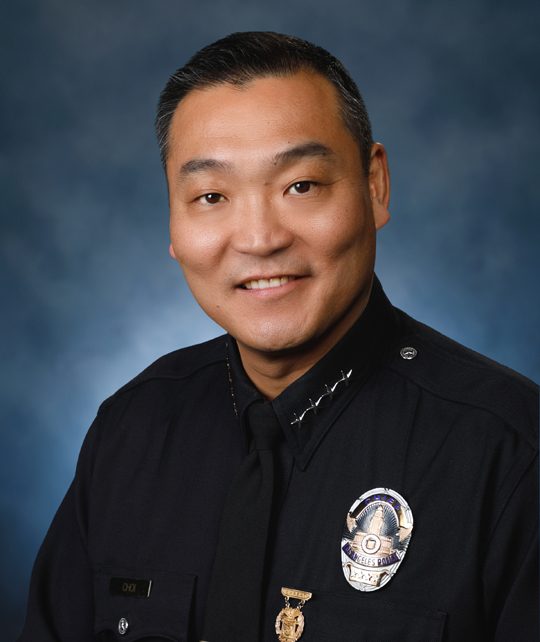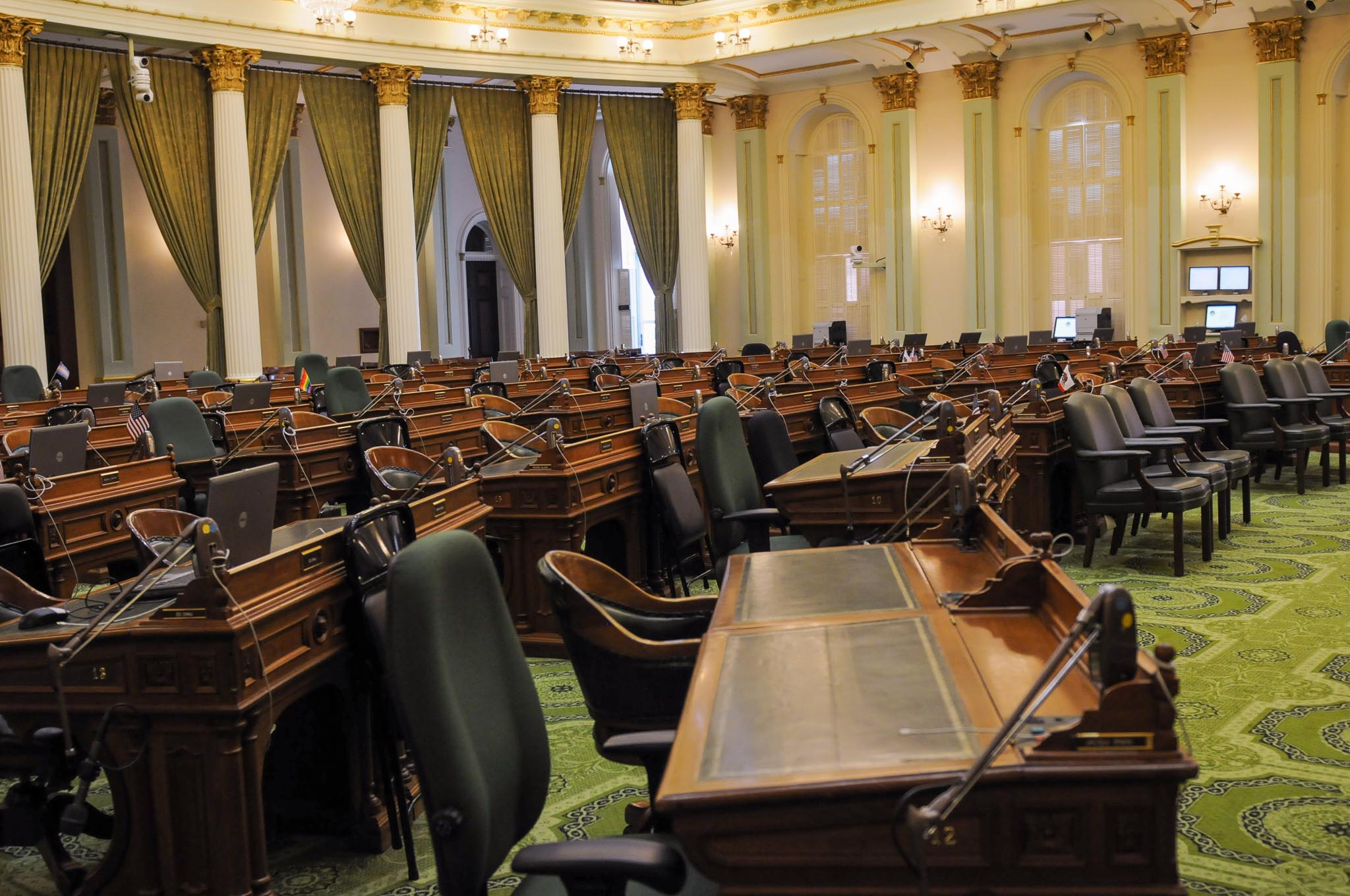
Interim Los Angeles Police Chief Dominic Choi. (Photo: www.lapdonline.org)
Reality Bites: LAPD Interim Chief Choi Dances on KFI
Beyond being scolded for not reporting crimes, where does that leave the public?
By Thomas Buckley, June 4, 2024 2:09 pm
According to John Kobylt of KFI, no sitting Los Angeles Police Department chief – permanent or interim – had ever appeared on his – even when paired with the recently retired Ken Champeau – show until Monday.
There is a reason for that.
Though Kobylt turned down his typical contentiousness for the interview, Interim Police Chief Dominic Choi struggled mightily and eventually unsuccessfully to explain the crime problem in Los Angeles.
“He was dancing furiously,” Kobylt said afterwards about Choi’s appearance.
Choi focused on what he seems to believe is the very erroneous public perception that crime has increased in the city recently. He admitted violent crime is up, but said property crime is down.
He repeatedly made that argument when Kobylt would ask why people feel unsafe, but acknowledged that for many “perception is reality” and that the LAPD needs to do a better job combatting that perception.
“He was hiding behind the data and the data is fake,” Kobylt said. “I trust my eyes and my families and the people I know and the listeners.”
There was one very specific and key aspect of the perception issue Choi attempted to deflect into non-existence: “quality of life” crimes.
As Kobylt pointed out, not too long ago people got arrested for things like going to the bathroom in the street, screaming nonsensically and obscenely through the night, and for shooting up on the sidewalk.
Choi countered that those “quality of life issues that some people may perceive as criminal but it is not,” adding the department takes a “different approach” to the issue.
“We’re trying to get services out there,” Choi said.
And that sums up Choi’s – and all of the rest of the city officials – complete disconnect from the community. People believe crime is up because it is even though Choi, Bass, et al are attempting to define away the problem. Those aren’t crime crimes – their “quality of life issues,” therefore crime is not really up much at all.
Therefore, the so-called increase in crime is merely a matter of perception.
That is false.
Depending upon which city numbers are used, the homeless population has an enormous percentage of criminals among it. 40% of the people in jail in San Diego are homeless, half of the homeless in Portland, Ore. have been arrested and more than half in Los Angeles (and not arrested for “quality of life” issues, either.)
Attacking those issues has been proven – see New York City under Rudy Guiliani and his “broken windows” theory of crime. If a neighborhood is terribly run down and if minor crimes are being committed openly that will lead to an increase in more serious crimes in that area because criminals “perceive” a welcoming sense of having ‘free reign,” as Kobylt put it.
The flip side of that perception is also true: if law abiding citizens see all of that happening continuously, they will feel unsafe even if they are not personally involved in a crime.
Imagine for a moment you walk into a room and you know that half of the people there are criminals, they have arrest records. If you, for whatever reason, can’t leave you keep your head on a swivel, you stare intently at potential threats, you never put your drink down, let alone your purse, and you feel horribly anxious as long as you must remain there.
And even after you leave, your senses are still uncomfortably heightened.
That is exactly the feeling most people have when confronted with utterly out of control homeless situation and the scatologic zombies they see gathered by the dozens in encampments and on streets and in park and in certain areas, such as downtown LA and Santa Monica.
People are not scared of one guy sitting on the sidewalk with a cup in front of him asking for change – but people are rightfully terrified when dozens of “mental patients are wandering around,” as Kobylt put it, that same sidewalk. People properly perceive the threat associated with walking through a gauntlet of unstable, drug-addled, nothing really left to lose people and turn around or tell themselves they are never going there again.
Choi, however, downplays this evolutionary survival method by, again, classifying what is troubling the public as “quality of life” issues (with criminal justice reform, they are not called ‘crimes’ anymore.)
Kobylt said city of LA’s leadership is “no longer interested in making the city livable” because of their blinded “religious-like belief” in so-called social justice and criminal reform
“We have a standoff between normal people and their sick religion,” Kobylt said. “And we can’t convince them they’re wrong.”
And Choi also deflected some of the blame back on to the public, saying that people need to report all crimes because if the LAPD does not know about it certain trends, etc. it cannot really do anything about the problem.
“Bad data equals bad strategy,” Choi said.
Kobylt pushed back on the idea, saying that people and stores are not reporting crimes because nothing ever gets done, the cops simply don’t show or if they do it is far far too late.
Choi said if it is a “crime in progress” an officer will be on-scene withing seven minutes. The emphasis was on “in progress,” admitting that if it is not in happening right at that very moment officers will take more time to respond.
He also asked the public to “go to the website” to report crimes, if they are not an emergency situation, presumably.
The request sounded too much like a call to any customer service line and being dismissively told to go to the website to get an answer, etc.
The interim chief should know that telling people to “go to the website” is absolutely not what they want to hear when talking about crime.
Speaking of ignoring requests, the LAPD did not respond to an email from Globe asking Choi if he would like to clarify certain comments and positions. The questions left unanswered are at the bottom of this story.
But assume Choi is correct – crime has dropped overall and the “perception” crime has increased is being driven by media and social media sensationalism and the public misclassifying nasty things they see and hear as crimes.
Beyond being scolded for not reporting crimes, where does that leave the public?
Waiting for the next $24 billion to be misspent on the homelessness problem and being continually being told they are wrong to be worried, one supposes.
The interview can be found here.
The questions sent to Choi:
· The chief referenced the “perception of crime” being worse than actual crime. How is that justified?
· The chief said that the department is data driven so – except for violent crime – the numbers are actually lower, hence the mistaken perception. Can you send those numbers?
· The chief said one of the problems with the perception of crime is that people do not report crimes as they should – i.e. if people reported crimes the perception would match the “data reality” the department has. Is that not a distinction without a difference?
· Going beyond that, lower level crime reporting has gone down – talk to store owners, etc. – due to the belief that the police won’t show up anyway so why bother, something the chief seemed to admit. Would you care to expand upon that?
· The chief also separated out “quality of life” crimes from other, what he presumably considers “real” crimes when discussing the issue. Define quality of life crimes and explain why they should not be the (typically for a patrol cop) most important crimes?
· Again, as to QOL crimes, the public defines them as possibly dangerous people lining the streets, creating a feeling of general concern. If the department is not looking at those crimes as real and worth its attention, isn’t that why the public in general feels unsafe, hence the perception actually being accurate no matter what the chief says?
· The dismissive use of the old “perception becomes reality” by the chief was deeply inappropriate. The issue of crime is not the province of the gadflys and the naysayers – it is a real and truthful perception, hence people not wearing good watches out in public, etc. How can you explain the chief’s disdain for a proper and common perception?
· Finally, to reiterate – the chief was rather clear in his assertion that certain crime is down but admitted that could be because people do not report it as they should, creating a Catch-22 loop for the public and an impossible to prove/disprove statistical/perceptional question. Would you please expand on that topic?





Good article call out the city and their new policy of gaslighting instead of competence and actually functioning
We pay them. We need to fire everyone in city government
Wow, this is scary. And maddening. This guy (L.A. Police Chief Choi) is simply mimicking Mayor Karen Bass’ quasi-commie nonsense: “Perception of crime,” “quality of life issues are not crimes,” blah, blah, blah, blah, blah. Heck, First Degree Murder is a “quality of life issue” if it comes to that. I almost expect him to redefine THAT!
More later, hope to come back later to blast outrage over the specifics of this. Plus I want to listen to the podcast in the meantime. Grrrrr!
THANK GOD we got out of El Lay 25 years ago….
It used to be a pretty nice place when I was a kid, but admittedly, that’s a long time ago now…
This really pains me to say this because I immensely respect good cops but too many law enforcement agencies have gone rogue and are faking their arrest stats to cook the books and hide the truth.
LA’s Democrat leadership is “no longer interested in making the city livable” because of their blinded “religious-like belief” in so-called social justice and criminal reform…and also because no doubt they’ve been installed into office with voter fraud and rigged voting machines so they don’t have to be worried about being held accountable by voters?
Have to agree TJ.